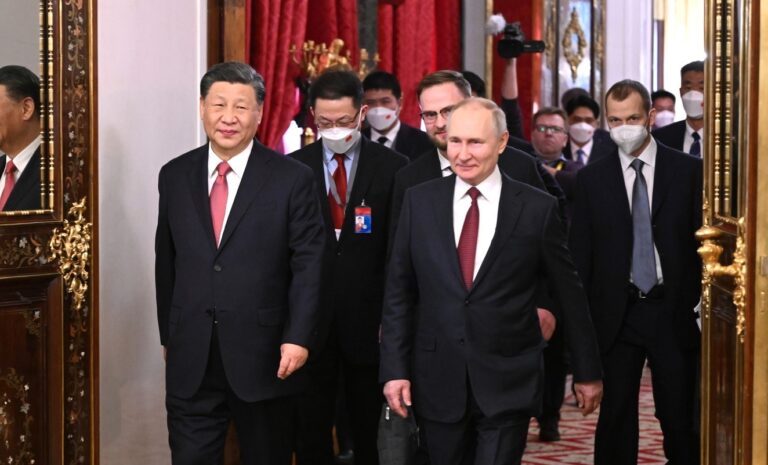“Changes are taking place now that have not been seen for a hundred years. Together we are leading these changes.” In late March, Chinese President Xi Jinping greeted his Russian counterpart Vladimir Putin this way at the end of a historic and crucial meeting in Moscow, almost sneaking out of a side door of the Kremlin. It seems like a lifetime ago, yet it was yesterday.
And in this short and at the same time very long time span, in which the war in Ukraine has continued to inflame the world, China and Russia have built the scaffolding of this “great change.” Thus involving all those emerging countries that – to put it mildly – do not identify with the Western bloc.
The “new pact” between Bear and Dragon literally wants “another world,” embodied by the alliance called BRICS (initials for Brazil, Russia, India, China and South Africa).
A multipolar world, one that will unhinge the dominance and influence of the United States and with a common currency that succeeds in breaking the “yoke” of the dollar as the international reference currency.
An ambitious world that will now have to change its name, as it has seen the entry of new states that intend to counter NATO, the G7, the World Bank and the International Monetary Fund politically and economically.
Table of Contents
What are the BRICS and which states have joined
The acronym BRICS represents the group of emerging economies in the 2000s with high growth prospects and common goals. Namely Brazil, Russia, India, China and South Africa. Together they group half the world’s population (more than 3.5 billion people).
The major geopolitical shakeup caused by the Russian invasion of Ukraine provided especially for China. Which, perceives itself and is perceived as the leading power in this union, an opportunity to further polarize the contention with the Western bloc by inviting other countries into the “club.”
Thus, here is where six more nations will join the “Global South” bloc as of January 1, 2024: Saudi Arabia, Iran, Egypt, Ethiopia, Argentina and the United Arab Emirates.
And it does not end there. Applying expressly to join the bloc have been at least 22 other countries, and as many have expressed keen interest in joining. Clear sign of a growing anti-Western sentiment? In economic terms certainly yes, much more than ideological.
Read also: Will BRICS emerging countries wage (economic) war on the West?
An explosive alliance: internal tensions within the BRICS
It is equally clear that the BRICS is a highly heterogeneous front, in which countries with conflicting interests coexist. Russia and China are a prime example. Two touching empires, allies by circumstance and tactical, certainly not strategic, economic partners. The strategy of both is to rule alone, not in pairs.
A rich and promising slice of investment concerns the disputed Central Asia, where Moscow fears the unstoppable growth of Chinese influence.
Then, when one considers that another major Asian power, India, is also in the group, the risking becomes more intense. Internal balances are fraught with tension, especially in light of the last summit in South Africa. Where the entry of the six new countries did not satisfy everyone, to say the least.
India itself, for example, is not at all happy about Iran’s promised membership. Which was approved under heavy pressure from Russia and because of its open rivalry with the United States. And is equally concerned about the centralizing and dominating tendency of China, which wants to build a self-centered bloc.
Iranian entry qualms also concern Brazil and South Africa because of their excellent relations with the West. Then, at the geopolitical level, one must also consider the open clash between the Saudi and Iranian pan-Arab missions and the (even armed) dispute between Egypt and Ethiopia over the Nile’s water resources.
Also India has called for a review of membership criteria, gaining a tentative reassurance from South African President Cyril Ramaphosa. Ahead of the next summit next year in Russia (scheduled for October in Kazan), “a list” of other “potential partner countries” will be presented.
Read also: This is how China throttles Africa: all about the BRI “debt trap”












